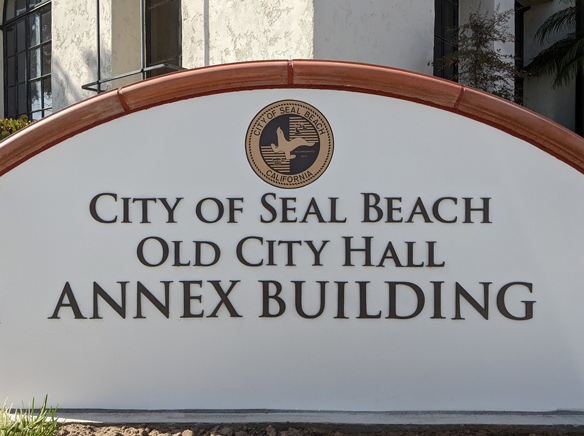The City Council on Monday, Oct. 18, rejected the proposed remodel of the gas station at PCH and 13th Street.
The vote was 4 to 1. District Five Councilman Nathan Steele cast the dissenting vote.
The Council Chambers were mostly full throughout the roughly two-hour, 45 minute meeting. Seats began filling up when the meeting started at 7 p.m. The public hearing on the gas station project was the last item on the agenda. The audience applauded the final vote.
Area residents have long opposed the project, citing concerns that the proposed convenience store will become a 24 hour store, that in the future the store might be allowed to sell alcohol, and that it would add to congestion on the narrow residential side street.
Technically, the council was considering an ordinance to change zoning, a General Plan amendment, and a Negative Declaration. A Negative Declaration basically says the project will not result in significant environmental changes.
According to the staff report prepared by Planning Manager Shaun Temple, the state government is requiring underground, single-wall storage tanks be replaced by 2025. “G&M Oil is using this as an opportunity to modernize the service station as a considerable amount of demolition will already need to take place,” Temple wrote.
Another controversial aspect of the project was a proposed convenience store that would have been added to the site if the remodel project had been approved.
Steele explained his dissenting vote in an after-meeting email.
“My singular focus as a councilman is to do everything in my power to keep Seal Beach from going out of business. Our 5-year forecast is showing a cumulative $15 million dollar deficit. We can fill that hole by finding revenue sources and by cutting costs,” wrote Steele in a 527-word message.
(For more on the Seal Beach’s finances, see “Are deficits in the city’s future?”)
“The Chevron station ‘debate’ is typical of recent Seal Beach debates. Residents believe that their version of ‘small town charm’ includes only them and their million dollar homes in Old Town at the expense of the rest of Seal Beach,” wrote Steele.
“They came with a list of about 150 neighbors who signed a petition opposing the mini mart. That’s 200 people in a city of 25,000, out to impose their version of ‘not-in-my-backyard’,” Steele wrote.
A physical copy of a petition with 138 signatures was made available to the public at the meeting.
The city also received more than 50 emails opposing the project. Many were signed with the words, “We want neighbors, not a convenience store.”
Approximately 13 people spoke out against the project. The audience applauded after every speaker took their turn.
Steele was the first council member to speak after the hearing.
He said if you polled his neighbors in Leisure World and asked them about the Chevron station, they would probably go “huh.”
“I’m a business guy. I’ve been a business guy my entire adult life,” Steele said.
He said he was dealing with a room full of people who were adamantly opposed to something that looked to him like something that would be better than what they have today.
You can hear murmurs from the audience on the council video.
“The gas station is going to have to pull up their tanks anyway,” Steele said.
Repeated comments from the audience prompted District Two Council Member/Mayor Tom Moore to say: “Please remain civil.”
“When all of this is said and done, we’re going to have a better neighbor than what they currently are,” Steele said.
“You guys bought your houses on a skinny little street with a gas station at the end and now you’re complaining about it,” Steele said.
Again, the audience reacted negatively.
“Please be quiet,” Moore said.
“This city has chased off businesses for the last 20 or 30 years,” Steele said.
“You have a terrible reputation in the business community around Southern California,” Steele said.
He said in the last 30 years, Seal Beach had forgone $30 million in tax revenues.
Steele said Seal Beach had acquired a reputation as a bad place to do business.
District Four Council Member Schelly Sustarsic asked about the gas tanks that would be removed.
Community Development Director Alexa Smittle said the remediation of the site would take place regardless of this development. She said that was not part of this application.
Sustarsic said she wasn’t sure how you go about developing something when you’re not even sure of what’s under there yet.
“We’re supposed to be voting on the Negative Declaration, saying it’s acceptable, when we’re not sure yet where the contamination is there,” Sustarsic said.
According to Smittle, the Negative Declaration addressed the proposed use versus the current use. “I understand what you’re saying, it’s hard to separate the two, but they are two separate processes,” Smittle said.
Sustarsic said it was concerning that issues concerning the site had been going on for 29 years.
Sustarsic was also concerned about traffic circulation at the location.
She also said she was concerned with the changes required for the project to go through.
Sustarsic also raised the question of whether the residential height limit would remain in place.
(At least one of the letters to the council argued that the rezoning changes would allow the building of three to four story housing.)
Smittle said the Measure Z height limit would remain. She said you can’t build up to 35 feet because a property had been put in a different zone.
Later, District Three Councilwoman Lisa Landau argued that Sacramento could override Measure Z. She was the next to speak.
Landau said zoning is what keeps the character of the town and that changing the zoning from residential to commercial changes the character that the residents bought into.
“I talked to residents. I got 65-plus emails. Not one person was in favor of the remodel,” she said.
“I feel like we’re elected to represent the voice of our residents and so I feel that it’s important to listen to them,” Landau said.
That triggered a round of applause.
Landau, citing the remediation project at the same site, also said she wondered why the city was rezoning when they didn’t know what they were dealing with at the site.
More applause.
According to Landau, there had been a leak at the property for 29 years. She said not doing a cleanup was not being a responsible neighbor.
Landau said that changing the zoning to commercial would lower the threshold for cleaning up the site. One of the Seal Beach residents who spoke against the project was former council member Ellery Deaton, who also said changing the zoning would set a lower standard for remediation.
District One Council Member Joe Kalmick said he appreciated the passion of the local residents. “But I’m a little disappointed in some of the hyperbole to make the point,” Kalmick said.
“I would hope that decisions are going to be made on sound fact and not that ‘we’re all going to die’ if we were to allow the mini mart,” Kalmick said.
Landau said she didn’t feel the nominal revenue from the mini mart was worth affecting the quality of life of Seal Beach residents.
The audience applauded.
Sustarsic said she would prefer the clean-up at the site start was before she voted for the Negative Declaration.
Moore said that, like Landau, he had not heard one resident that wants the project. “It is difficult for me to vote for something that not one resident wants,” Moore said.
He said there was a 7-Eleven a block away. “I think it’s a bit too close to residential for a mini mart,” Moore said.
The motion was made to deny the project.
City Attorney Nicholas Ghirelli said the council needed to approve a formal resolution. He said staff would come back with a formal resolution.
“So yes is a no,” Moore said.
The final vote was 4-1 to deny the project. Kalmick cast the last vote, joining the majority.
The audience applauded and some individuals cheered.












